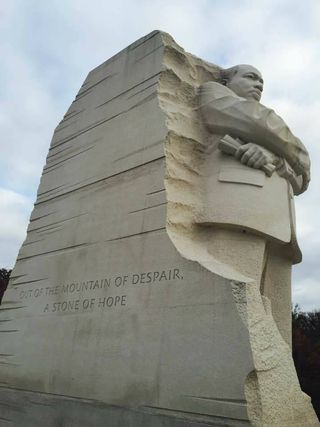Beauty
The Beauty of Being Bound
A humble call to my psychology family to step up against a climate of hate.
Posted November 17, 2016
Ali F. Marvin, a doctoral student in the University of Alaska Anchorage clinical-community psychology program, asks psychologists to step up and stand in solidarity with communities to resist a hateful climate.
Sitting in a classroom last fall, I heard my professor talk about an Alaska Native woman who wanted to say “thank you” to a group, but English words could not translate her true meaning. She explained that, in her language, “thank you” really means “I am bound to you.”
Please consider the depth of those words.
I am bound to you.
It resounds like an oath. Being bound to a group speaks of devotion and being relationally interdependent. Hearing such ardent words was quite foreign and definitely piqued my interest at the time.
Today, as I contemplated her statement, I realized her bold words conveyed a radically different values set – especially compared to the divisive and hateful words that have been flung this past year with far too great a comfort and cavalier. Her culture values and found beauty in relational interdependence.
As I thought more about it, I realized that interdependence and connectedness is true for all of us. Sure, we are all unique individuals and we live in a society that emphasizes independence and competition. But the truth is that we are all social creatures and that a big, important, and necessary part of our selves is our connectedness, membership, and belongingness with other people.
This truth washed over me like a wave.
With the harrowing election season, her words haunt me with an aching wish that more people in our nation would recognize that we are indeed bound to one another. We share our communities, companies, schools, and places of worship with one another. We go about in our fantastically diverse communities doing similar things as our fellow citizens- working hard to provide for a family, perhaps attending our children’s school plays, frequenting our favorite coffee shops, and running endless errands before the holidays.

Yet during this election season, our beautifully diverse communities have been assaulted in an unprecedented way. Vile words of sheer hate and prejudice have spread like cancer throughout our nation through seemingly every possible outlet. These violent words are meant to cause division and aggression towards persons of color, immigrants, the LGBTQ community, women, and those with disabilities. Such widespread existence of bigotry and hate is undeniable, incomprehensible, and inexcusable and simply must not be tolerated. Not only as professionals in psychology – but as human beings – we must now stand up for the values that recognize and honor our interdependence.
This recognition of our interdependence and connectedness is essential, especially at this time when prejudice and hate seem to have been normalized, accepted, and tolerated. There are no silent, objective observers, and non-partisans when it comes to issues of hate and prejudice. We hold values about things that are important to us, and these values shape who we are. And I sure hope that as professionals in psychology, we value and regard with the utmost importance the inherent humanity and dignity of all peoples. This is a time to bring the fullness of who we are as psychologists to the forefront, to stand in solidarity with our communities under assault.
Standing up for the values we hold strongly can motivate our actions in empowering and gratifying ways. For example, Rosa Parks refused to get off the Montgomery bus because she was motivated by her belief and commitment to values. Mother Teresa served the needy in Calcutta because her devotion and values spurred her onward. Aligning our actions with our values such as these women did can tap into a deep-seated source of motivation and energy that can persevere in the midst of struggle.
Exemplary individuals positively impacted history because they did not only consider their individual wants and needs. In fact, if Rosa Parks and Mother Teresa had only considered themselves, we may not even know their names. Their actions were positively impactful because they reached far beyond themselves. They embraced a devotion to and connection with their communities. Through their actions, they essentially told their communities “I am bound to you.” Perhaps this is true self-actualization, when we drop the “self” in devotion to others. Valuing connection and devotion to our community can spur us to take action in meaningful ways that extend beyond ourselves.
For those of us who do not have any intention to be community activists, the importance of embracing devoted connection is still deeply relevant. Even in your conventional roles as psychologists working in offices, classrooms, laboratories, or clinics, it is still important to identify to whom you are “bound.” Right now, you may be bound to students, mentees, supervisees, employees, colleagues, or clients who have gone through a traumatic election and are currently experiencing real fears. My ardent hope is that psychologists will actively promote their values that embrace diversity, humanity, and dignity. My hope is that psychologists will actively condemn hate. As psychologists, do not underestimate your influence, the power of your words, or the impact of your silence.
I love the words of Gandhi, “In a gentle way you can shake the world.” Do not underestimate the power that speaking the truth can have on people. Whether you are a well-known and widely published psychologist, or a doctoral student toiling after your degree, what is clear is that we cannot and must not remain silent. Even if our words are lost in the tornado of white noise, we will have at least lived in alignment with the values that our humanity demands.
I believe that most of us came into the field of psychology with a deep and genuine desire to help others, a sense of being bound to others through our teaching, research, service provision, community work, or other professional roles. In other words, we came into this profession to develop ourselves into higher and finer capacities. Here I have only encouraged a deeper examination of these admirable desires, and humbly ask that you take action in some form, in whatever your sphere of influence.
When we broaden our vision beyond ourselves and examine our values regarding our communities, we may further identify who our “tribe” is, and to whom we are “bound.” These values may activate and empower our work in new and fresh ways. When we live a life aligned with our values, and include others in this vision, we may discover there is beauty in being bound and devoted to others.
~~~~~~~~~~~~~~~~~~~~~~~~~~
Ali F. Marvin (Tlingit Indian) is a doctoral student in the UAA clinical-community psychology program. Her research interests are centered on marginalized populations including the homeless, with a special interest in problems disproportionately affecting Alaska Native peoples. She seeks to bridge research with practical solutions to benefit the Alaska community.




